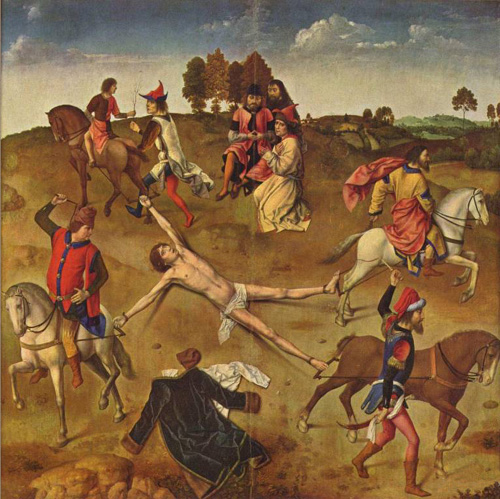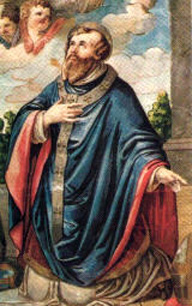 The Martyrdom of St. Hippolytus St. Hippolytus and St. Cassian, Martyrs by Father Francis Xavier Weninger, 1876
St. Hippolytus, an officer of the body-guard of the emperor Decius, had been born in the darkness of idolatry, but he had become a Christian, with all his household, in consequence of witnessing the many miracles which St. Lawrence performed while in the prison under his charge. He had also been present when the saint, lying on the red-hot gridiron, endured the most terrible tortures. At the sight of the heroism of St. Lawrence, he was filled with the desire to denounce himself a Christian, but he was prevented by St. Lawrence. But when this martyr had gloriously ended his combat, Hippolytus, with the assistance of a priest, named Justinus, buried the sacred remains with great devotion and veneration. The emperor on being informed of it, had Hippolytus seized and brought before him. He asked him if it was true that he had become a Christian? Hippolytus answered firmly: "Yes, I am a Christian, and moreover resolved to die such." The emperor, who had always highly esteemed him, endeavored, first by promises and then by menaces, to induce him to forsake Christ. As, however, all was unavailing, he caused him to be tortured. He was accordingly stretched on the ground, whipped with scourges, and beaten with clubs so fearfully, that it was believed he could not survive. But God, by a visible miracle, prolonged his life. Keeping his eyes fixed upon Heaven, he frequently repeated: "I am a Christian, I suffer for Christ's sake." After having been tormented for a long time, he was cast into prison, and the prefect received the order to behead him. Before executing this order, however, he went to the house of Hippolytus to secure his property. Finding the entire household had become Christians, he took them beyond the gates of the city and had them beheaded. Concordia, an old and holy matron, who had been Hippolytus' nurse, was scourged until she expired, because she encouraged the others to remain firm in their faith. At last, Hippolytus was taken out of prison and fastened to the tails of two horses, and dragged by them until he was torn to pieces, and his heroic soul was in the presence of Him Whom he had so fearlessly confessed.  On the same day, though at another place, St. Cassian suffered a martyrdom of unprecedented cruelty. This saint, was bishop of Brescia, but had been banished from his See on account of his faith. He intended to go to Rome and offer the Pope his services for the salvation of souls in some other place. On his way, he changed his mind, and taking up his residence at Imola, a town in Italy, he resolved to teach children to read and write, hoping that occasion would not be wanting to do good. In this apparently humble position, he was no less zealous than he had been in the administration of his diocese. He taught the children with love and gentleness, and endeavored to inspire them with respect for the Christian faith, fear and horror of sin, and love of virtue and piety. He continued in this occupation with great zeal for some years, to the great benefit of young and old, when suddenly a terrible persecution of the Christians arose. On the same day, though at another place, St. Cassian suffered a martyrdom of unprecedented cruelty. This saint, was bishop of Brescia, but had been banished from his See on account of his faith. He intended to go to Rome and offer the Pope his services for the salvation of souls in some other place. On his way, he changed his mind, and taking up his residence at Imola, a town in Italy, he resolved to teach children to read and write, hoping that occasion would not be wanting to do good. In this apparently humble position, he was no less zealous than he had been in the administration of his diocese. He taught the children with love and gentleness, and endeavored to inspire them with respect for the Christian faith, fear and horror of sin, and love of virtue and piety. He continued in this occupation with great zeal for some years, to the great benefit of young and old, when suddenly a terrible persecution of the Christians arose. He was one of the first who were taken prisoners. The tyrant commanded him to sacrifice to the gods. The holy bishop and teacher refused, as might have been expected, and tried to convince the judge of his fearful blindness in worshipping dumb idols or making gods of godless men. The tyrant, furious at his arguments, ordered the executioners to strip him of his clothes and tie his hands behind his back, and leave him exposed to the mercy of the children whom he had taken such pains to teach. The children, who had been taught that Cassian was a magician and consequently must die a most painful death, took their sharp iron pencils with which, in those days, they wrote upon their wax tablets, and pierced him with them till the blood ran profusely from his veins. This torture lasted long and was extremely painful. The saint, however, never complained of the ingratitude of his pupils, nor gave a sign of impatience, but praised and thanked the Lord until his soul went to Heaven to receive the crown of martyrdom.
PRACTICAL CONSIDERATIONS.
I. St. Hippolytus turned his eyes to Heaven during his martyrdom. Many holy martyrs, in their sufferings, and many saints, in their sickness and adversity, did the same. They desired to show by it, that they bore their pains for the love of God. They also recalled to mind the recompense which they hoped to receive for their sufferings, and were encouraged by this remembrance. Do you the same in all your sorrows, cares and afflictions, and show, by it, that you will bear all for the love of God. Call on the Almighty for strength and help. Think of the great reward. By this means, you will be strengthened to endure everything with patience and even with joy. No labor, no pain, no care will be too hard for you to bear, nor last longer than you can endure, if you raise your eyes to Heaven, especially if you consider that your labor, your cares, your pains are very short in comparison to the eternal rest. "Raise your eyes upward during your work," says St. Ephrem,
"and you will consider nothing hard while contemplating the Heavenly joys." "The present suffering," says St. Thomas of Villanova, is only a moment in comparison with heavenly joys. That which hurts us passes quickly,
but that which we receive as reward remains eternally." II. St. Cassius especially endeavored to impress three moral points upon the minds of his pupils; esteem for the true faith, horror for sin, and love of virtue and piety. Oh! that all parents and teachers would try to impress these sentiments deeply upon the hearts of their children and pupils! How different our youth would be! But these points should be recommended to the consideration of those also who are past the age of youth. Whoever you are, esteem the true faith above all things; for, it is a priceless grace that the Almighty has not permitted you to be born in Judaism or idolatry, but has granted you that faith without which there is no salvation. Fear and abhor sin more than any other evil; for, it can do you more harm than any other. Sin alone can make you eternally unhappy. Love virtue and piety; for, "godliness is," according to the Apostle, "profitable to all things (I Timoth. iv)." Without virtue we cannot go to Heaven. "Vainly does he desire to obtain the heavenly glories, who is not adorned with virtue. Virtue is the road to glory. Through virtue we attain eternal honor and joy," writes St. Bernard.
Martyr: A witness for Christ. In early times this title was given generally to those who were distinguished witnesses for Christ, then to those who suffered for Him; lastly, after the middle of the third century, the title was restricted to those who actually died for Him. The very first
records of the Church which we possess tell us of the honours done to the martyrs. It was the martyrs who, first of all, were regarded as saints; the relics of the martyrs which were first revered; to the martyrs that the first churches were dedicated. The name "martyrium", which at first meant the church built over a martyr's remains, was given to churches generally, even if dedicated to saints who were not martyred, though this usage was partly justified by the fact that a church was not consecrated till the relics of some martyr had been placed in it.
Benedict XIV., in his work on "Canonisation" (lib. iii. cap. 11 seq.), gives the modern law of the Church on the recognition of martyrdom with great fulness. He defines martyrdom as the "voluntary endurance of death for the faith or some other act of virtue relating to God." A martyr, he says, may die not only for the faith directly, but also to preserve some virtue—e.g. justice, obedience, or the like, enjoined or counseled by the faith. Further, he explains that to be a martyr a man must actually die of his sufferings or else have endured pains which would have been his death but for miraculous intervention.
_________________________ A Prayer to the Holy Martyrs to Obtain Their Protection
O ye blessed Princes of the heavenly kingdom! ye who sacrificed to the Almighty God the honors, the riches, and possessions of this life, and have received in return the unfading glory and never-ending joys of heaven! ye who are secure in the everlasting possession of the brilliant crown of glory which your sufferings have obtained! Look with compassionate regards upon our wretched state in this valley of tears, where we groan in the uncertainty of what may be our eternal destiny. And from that divine Savior, for Whom you suffered so many torments, and Who now repays you with so unspeakable glory, obtain for us that we may love Him with all our heart, and receive in return the grace of perfect resignation under the trials of this life, fortitude under the temptations of the enemy, and perseverance to the end. May your powerful intercession obtain for us that we may one day in your blessed company sing the praises of the Eternal, and even as you now do, face to face, enjoy the beatitude of His vision! Amen
(St. Alphonsus de Liguori)
http://catholicharboroffaithandmorals.com/ |